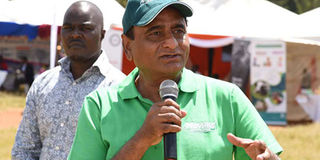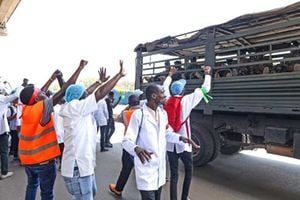Guru’s done his part, but where are other tycoons?

Narendra Raval Guru, chairman of Devki Group of Companies, donated money to support the war against the coronavirus. PHOTO | FILE | NATION MEDIA GROUP
What you need to know:
- The United Nations Economic Commission for Africa has revised Africa’s growth downwards from 3.2 per cent to two per cent.
- Larger firms could also work closely with these innovators, donating their infrastructure, skills and expertise to ensure that viable solutions are deployed.
The silence of Kenya’s billionaires continues to grow louder by the day even as the country gets into a decisive phase in the fight against the Covid-19 pandemic.
Wealthy people across the world have been splashing billions of shillings to support their countries.
Some of this cash has reached Nairobi through generous donations from philanthropists such as Chinese billionaire and Alibaba co-founder Jack Ma, who sent Kenya, alongside 54 other African countries, 20,000 testing kits each last month.
An advisory note prepared by a group of professionals, among them economists, business leaders, entrepreneurs and philanthropists, has called out high-net-worth individuals on the continent to do their part in supporting their countries to battle the virus.
In Nigeria, Aliko Dangote, one of Africa’s wealthiest men, has donated more than Sh50 million through the Aliko Dangote Foundation.
South African Johan Rupert and Nicky Oppenheimer donated $114 million (Sh11.4 billion) to the Solidarity Fund to assist small businesses and their employees tide through the tough times. Italy’s tycoons have donated more than $44 million (Sh4.4 billion).
EMERGENCY FUND
In total, Jack Ma, through his foundation, donated 1.1 million testing kits, six million masks, and 60,000 protective suits and face shields.
They were sent to Ethiopia, from where they were distributed to all countries in Africa.
A fundraising committee set up by President Uhuru Kenyatta will start mobilising citizens to kick-start Kenya's version of a Covid-19 solidarity fund.
Only a handful of companies have made public their contributions, which have mostly come in the form of hand sanitisers.
On Thursday, Narendra Raval Guru was the first Kenyan billionaire to support the emergency fund after donating Sh100 million worth of oxygen masks to all government hospitals.
“Oxygen will be collected from our Mombasa, Ruiru and Athi River Devki Steel Mills factories in exchange for empty cylinders,” the steel magnate said in a letter to Health Cabinet Secretary Mutahi Kagwe. Other billionaires are still silent.
Small companies and individuals are doing their part donating food items, paying salaries for staff on leave, and giving mattresses, masks and other essentials to the vulnerable.
The note proposes that rich people should be mobilised to donate to relief efforts. The brief says that, to do so, governments can provide additional tax incentives to these individuals to help boost their contributions.
GROWTH ESTIMATE
The brief estimates that African governments will need more than Sh10 trillion in stimulus packages to pull their countries out of the economic crisis.
An advisory notes that 80 per cent of jobs in Africa are in the informal sector and cannot be conducted remotely.
“This is posing an additional challenge for governments to contend with,” it says, while noting that in less than three months, the virus has infected over half a million people, torn families and societies apart, destabilised economies and disrupted global value chains.
“For African countries, this virus is expected to overwhelm already insufficient healthcare facilities and reverse the economic growth that many countries have been experiencing in recent years,” it adds.
Already, the United Nations Economic Commission for Africa has revised Africa’s growth downwards from 3.2 per cent to two per cent.
The brief was prepared by a team of 12 business leaders and executives, among them African Leadership Network chief executive Isaac Kwaku Fokuo Jr and The Boardroom Africa founder and executive director Marcia Ashong.
Others are Ada Osakwe (Nigerian economist), Ory Okolloh (director of investments at Omidyar Network), Kwame Asiedu, Lai Yahaya, Mohamed El Dahshan and Elizabeth Howard. Others are Eric Kacou, Biola Alabi, Aparupa Chakravarti and Bathsheba Asati.
SUPPORT PACKAGE
The brief says that times such as these call for rapid decision-making and innovative and effective solutions.
“African governments should draw on best practices and effective strategies … while also taking into account local particularities to tailor each solution to reflect the country’s context,” the advisory says, asking African governments to borrow some of the international best practices in dealing with the pandemic.
For instance, South Korea implemented the drive-through initiative, which increased testing points, reduced speculation and provided actual data on infection rates.
The tests take about 10 minutes and are free. The results are sent via SMS the following day.
By March 13, South Korea had conducted 3,600 tests per million people compared to five per million in the US.
In Peru, the government is giving $110 to families living in poverty during the 15 days of quarantine.
Singapore unveiled a stabilisation and support package amounting to $4 billion to support firms by defraying their wage costs and addressing short-term cash-flow needs.
It has offered additional support for sectors directly affected by the pandemic such as tourism, aviation, retail, food services and point-to-point transport services. This has included waiving some licence fees in the hospitality sector.
ASSIST INNOVATORS
It is also offering rebates on aircraft landing and parking charges, assistance to ground handling agents, and rental rebates for shops and cargo agents at Changi Airport.
The brief focuses on four key areas of concern and spells out short-term interventions that can be implemented by governments, including humanitarian assistance, ensuring business continuity particularly for the small and medium enterprises, implementing good governance practices in times of crisis and developing effective, broad-based communication strategies.
The group has also asked governments to develop clear metrics in identifying key sectors to direct funding towards.
It says particular attention should be paid to preserving livelihoods for the rural and urban poor, and identifying interdependencies and gaps that make African economies vulnerable to exogenous shocks.
It adds that industries such as retail, tourism and hospitality, aviation, manufacturing, healthcare, agriculture and construction ought to be prioritised.
“Mechanisms must be created to provide funding to African innovators who are working to develop solutions to Covid-19 related issues,” the team notes.
“Crowdfunding platforms can be a potential solution, but only if regulators are able to fast-track requisite policies and regulations to enable them to function effectively,” it added.
INTERNET ACCESS
Larger firms could also work closely with these innovators, donating their infrastructure, skills and expertise to ensure that viable solutions are tested and deployed as quickly as possible.
“Corporations must be willing to reorient their talent pool and repurpose their facilities to address the most critical issues arising from this pandemic. Companies must work together in redeploying their employees who would otherwise be redundant to companies facing higher demand,” the brief adds.
It says that, for instance, hospitality industry workers can support healthcare facilities, e-commerce companies and manufacturers.
For their part, fashion and garment factories can repurpose their operations to make face masks and gowns.
On communication, the brief has asked governments to offer free mobile data and public internet access to support remote working and access to information.
African governments must also lobby for debt relief and suspension of short-term payments on sovereign bonds to free up money for more urgent needs, such as supporting business continuity, supplying monthly survival packs to vulnerable communities and providing subsidies on water and electricity bills.
Finally, the team wants African professionals to be mobilised to donate their time to support firms that have been severely affected by the pandemic to rethink their business models, negotiate with their suppliers and banks and implement strategies to help them mitigate the effects of the pandemic.





